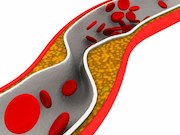After adjustment for hormone therapy use in women, associations no longer differed by sex
FRIDAY, March 9, 2018 (HealthDay News) — Higher circulating fibroblast growth factor 23 (FGF23) concentrations are associated with an increased risk of incident coronary heart disease (CHD), according to a study published online March 7 in JAMA Cardiology.
Bhupesh Panwar, M.D., from the University of Alabama at Birmingham, and colleagues examined the association of FGF23 concentrations with incident CHD risk within the Reasons for Geographic and Racial Differences in Stroke study. In a case-control design, data were measured in 829 participants who developed incident CHD and in 812 randomly selected participants.
The researchers found that higher FGF23 concentrations at baseline were seen in association with greater age, lower estimated glomerular filtration rate, higher urine albumin to creatinine ratio, and female sex. After adjustment for established CHD risk factors and kidney function, higher FGF23 concentrations were correlated with increased risk of CHD (hazard ratio comparing fourth with first quartile, 2.15). The magnitude and strength of these correlations varied by gender. After adjustment for hormone therapy in women (hazard ratio comparing fourth with first quartile: 2.4 for men and 2.34 for women, respectively) or when using sex-specific FGF23 quartiles (hazard ratio comparing fourth with first quartile: 2.65 and 2.26 for men and women, respectively), these differences were no longer observed.
“Heterogeneity in the association by sex may be caused by differences in the distribution of plasma FGF23 concentrations or the use of hormone therapy in men versus women,” the authors write.
Two authors disclosed financial ties to pharmaceutical companies, including Amgen, which provided funding for the study.
Copyright © 2018 HealthDay. All rights reserved.








